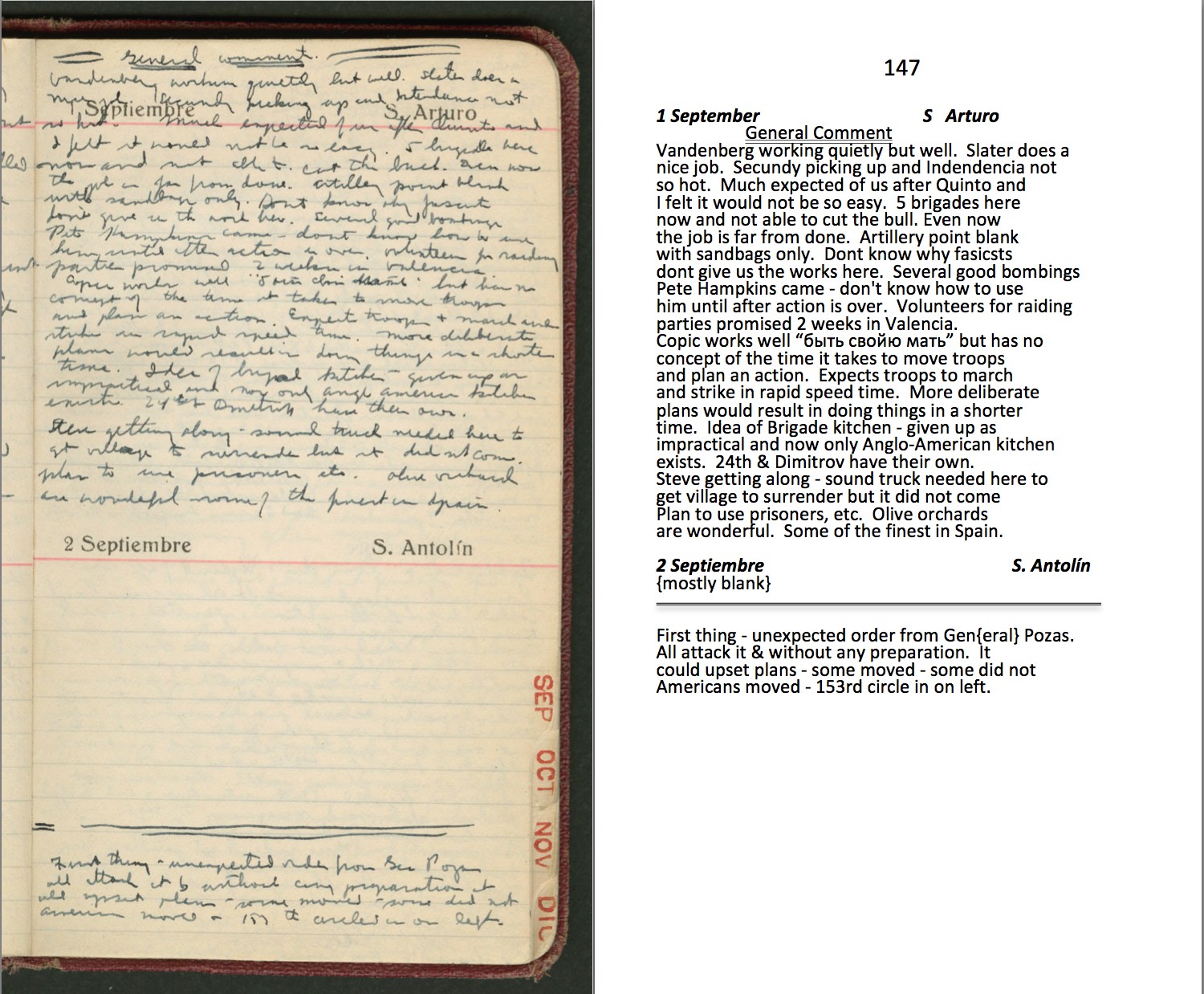
Merriman did not record events of September 1 and 2 and later wrote in the diary under the heading “General Comments”. He was busy in the trenches and streets of Belchite trying to work their way into the city. Instead it appears that Merriman is rating his commanders for future promotions. He says Vandenberg and Hugh Slater are working well. Slater was the head of the British Anti-tank company. He again complements Lou Secundy on his work in Transports/Auto-Park but says that the Intendencia is not working well. Water and food will become a serious issue for troops on the front lines in Belchite.
Merriman notes that there are five whole Brigades (perhaps 8000 men) attacking Belchite and coordination is not easy. He says it is hard to cut the bull. Merriman wonders why the Fascists have not attacked this concentration of men, although he notes that there have been several good bombing runs on the Loyalist troops. He notes that Peter Hampkins has come up from the Pozo Rubio Officer Training School but Merriman doesn’t know where to put him at this point. Merriman is told to offer people who volunteer for raiding parties into Belchite that they will get two weeks leave in Valencia.
In a “I come not to praise Caesar” moment, Merriman admits that Copic works well and then follows it with a Russian phrase in quotations. I have to thank a relative of mine who dug down into the dirt of our proletarian roots to give me a literal translation of “быть свойю мать” as well as the idiomatic working-class epithet. It literally means “he would fuck own mother”. That would fit into the context here that Copic works hard but would not hesitate to screw his own people. The less kind idiomatic interpretation is “fucking moron”. In either case, Merriman doesn’t hesitate to criticize Copic for throwing people into the breach without properly preparing a strategy for the attack.
Merriman notes that the kitchen situation is difficult with the five brigades wanting a unified kitchen but in reality the Americans and English have one and the Spanish 24th Brigade and Dimitrov Battalion having their own. Merriman says that Steve Nelson is getting on ok in the battle at this point and that they want a sound truck to try to convince the villagers and fascist troops to surrender. A truck would come by the 5th of September.
On the 2nd of September (outside the notes section), Merriman says that General Sebastian Pozas Perea, head of the Army of the East, ordered an immediate attack with no preparation. This must have echoed in Merriman’s head. Pozas had a track record of some famous failures. He created and was in charge of the Arganda Military Group organized at Jarama.¹ It is likely that the order from the top which sent the British and Americans over the top into deadly machine guns there came from Pozas’ command. He later led action at Huesca that failed.¹ Now at Belchite, he again is moving chess pieces without feedback from his on-the-ground commanders. In his other excellent book on the development of the Spanish Civil War, Art Landis calls Pozas “incompetent”. During the November 6, 1936, initial assaults on Madrid, Pozas and General Miaja were given mixed up orders by Largo Caballero on whether or not to defend Madrid or passively wait for negotiation… all this as General Yaguë’s armor was rolling towards the bridges over the Manzanares. In the midst of the battle, Pozas retired to his base at Tarancón, turning over his command to Miaja.² Pozas would continue to be in charge of the Army of the East until after the Retreats in the Spring of 1938 where he would be replaced by Lieutenant Colonel Juan Perea.¹
Some units responded to the order given by Pozas to attack (the Americans and the 153rd Anarchist Battalion) and others did not. The 153rd Battalion will move around the XVth to the northeast and to try to get into town from that direction.
_______________________________
¹ Art Landis, The Abraham Lincoln Brigade, ibid., p 53, 488.
² Art Landis, Spain: the Unfinished Revolution, International Publishers, NY. p 260.
